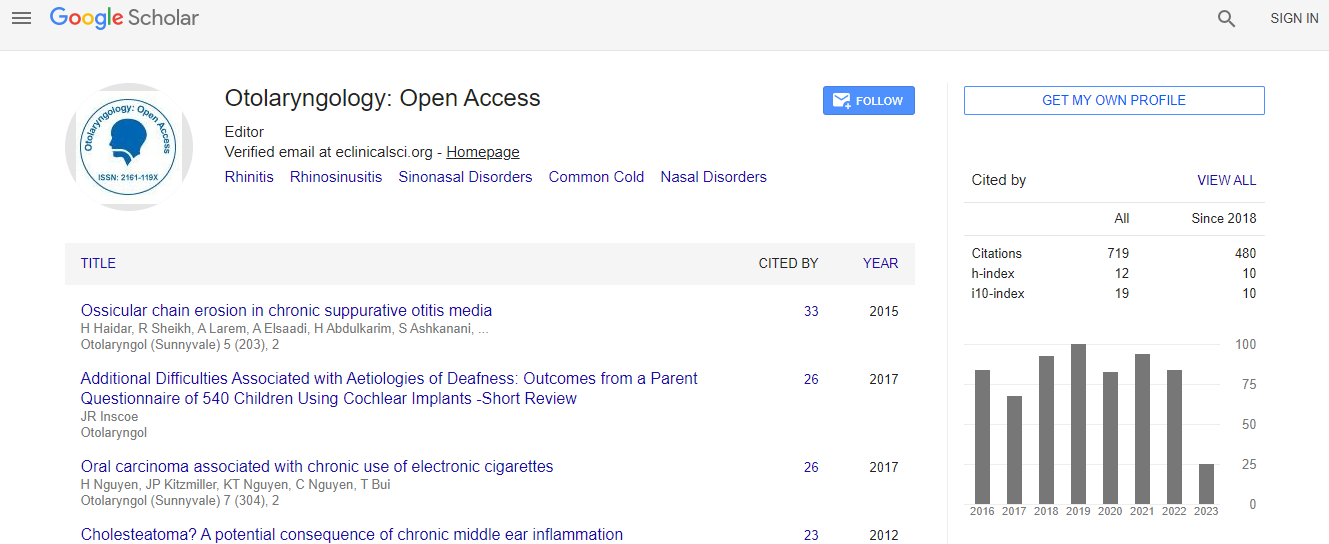Our Group organises 3000+ Global Conferenceseries Events every year across USA, Europe & Asia with support from 1000 more scientific Societies and Publishes 700+ Open Access Journals which contains over 50000 eminent personalities, reputed scientists as editorial board members.
Open Access Journals gaining more Readers and Citations
700 Journals and 15,000,000 Readers Each Journal is getting 25,000+ Readers
Google Scholar citation report
Citations : 925
Otolaryngology: Open Access received 925 citations as per Google Scholar report
Otolaryngology: Open Access peer review process verified at publons
Indexed In
- Index Copernicus
- Google Scholar
- Sherpa Romeo
- Open J Gate
- Genamics JournalSeek
- RefSeek
- Hamdard University
- EBSCO A-Z
- OCLC- WorldCat
- Publons
- Geneva Foundation for Medical Education and Research
- ICMJE
Useful Links
Recommended Journals
Related Subjects
Share This Page
Counteracting tinnitus symptoms and related cerebral synchrony by acoustic CR neuromodulation
International Conference and Exhibition on Otolaryngology
Peter A. Tass
ScientificTracks Abstracts: Otolaryngology
Abstract
We used a model based desynchronization technique, acoustic coordinated reset (CR) neuromodulation, to specifically counteract tinnitus-related neuronal synchrony thereby inducing an unlearning of pathological synaptic connectivity and neuronal synchrony. In a prospective, randomized, single blind, placebo-controlled trial in 63 patients with chronic tonal tinnitus and up to 50 dB hearing loss we studied safety and efficacy of different doses of acoustic CR neuromodulation. We measured visual analogue scale and tinnitus questionnaire (TQ) scores and spontaneous EEG. CR treatment was safe, well-tolerated and caused a significant decrease of tinnitus loudness and symptoms. Placebo treatment did not lead to any significant changes. Effects gained in 12 weeks of treatment persisted through a preplanned 4-week therapy pause and showed sustained long-term effects after 10 months of therapy: Response, i.e. a reduction of at least 6 TQ points, was obtained in 75% of patients with a mean TQ reduction of 50% among responders. CR therapy significantly lowered tinnitus frequency and reversed the tinnitus related EEG alterations in a network comprising auditory and non-auditory brain areas (CR- induced decrease of delta and gamma together with an increase of alpha), both indicative of CR-induced neuroplastic changes. Acoustic CR neuromodulation causes both a significant clinical improvement and a significant decrease of pathological neuronal synchronization.Biography
Peter Tass studied medicine (MD), physics (PhD) and mathematics (diploma) and made a Habilitation in physiology. Currently, he is director of the Institute of Neuroscience and Medicine ? Neuromodulation at the Research Center Juelich, Germany. Additionally, he is a full professor in Neuromodulation at Cologne University and head of the Research Division for Neuromodulation at the Dept. of Stereotactic and Functional Neurosurgery, Cologne University. He has published more than 100 papers and serves as an editorial board member of several journals.

 Spanish
Spanish  Chinese
Chinese  Russian
Russian  German
German  French
French  Japanese
Japanese  Portuguese
Portuguese  Hindi
Hindi 
